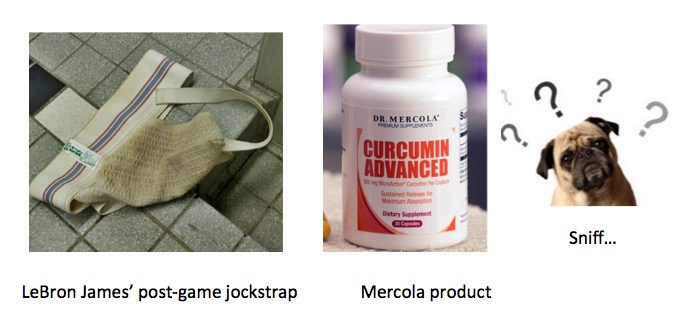
In science and medicine, much of the time there is no "right" answer. Different doctors will have different approaches to a given condition, a drug that may be great for one person may make another ill, and two surgeons—even in the same specialty—may have different opinions about what kind of surgery needs to be done, if any. Because of the differences in their training and experience, physicians will have a different interpretation of the risk and benefit of a therapy or procedure.
This type of uncertainty is one of the things that makes science and medicine fascinating, but also makes them overwhelming and confusing, even to the most knowledgeable laypeople. Few people have the ability to make an informed decision about what is best for them, so they turn to someone they trust. Unfortunately, Jade Erick trusted the wrong person—a naturopath, and she is now unnecessarily dead from an injection of turmeric—something that should have never been injected in the first place.
Even with multiple advanced degrees and a long career in biomedical research, there is plenty that I don't know. Most of what I need to know can be found in medical literature, but it can take a good deal of searching to get the right information, and that takes time. A short cut is often useful, and I have one that comes in pretty handy: Look up what Joe "Big Dough" Mercola says. The opposite will usually be true.
So, I visited the good doctor's site knowing that 1) He is selling a supplement for just about for every human malady since the ice age; 2) I would rather eat LeBron James' post-game jockstrap than take anything that Mercola sells; 3) I'm going to find something wrong with the science, thus saving me valuable time.
Sometimes decisions are difficult. Not this time.
So, let's take a look at what Big Dough Joe has to say about circumin—the principle bioactive component in turmeric.
Not surprisingly, Mercola's turmeric comes with a plethora of qualified claims. It is useful for everything!
- Prostate health
- Brain function
- Hormonal function in women
- Gallbladder function
- Inflammation
- High blood glucose
- Parkinson's
- Alzheimer's disease
- HIV/AIDS
- Mitigates stroke damage
- Multiple sclerosis
- Cataracts
- Cancer
"Curcumin appears to be universally useful for just about every type of cancer."
Joe "Big Dough" Mercola
"That's a 500 pound sack of bull----"
Cat food eating Josh Bloom
Any medicinal chemist will tell you that if claims for a supplement or drug include multiple, unrelated conditions, the chances of the treatment being useful for all of these is zero. Pharmacology does not work this way. When I see claims like Mercola's, the chances are pretty good that the product in question will be useful for none of these conditions.
Chemistry uber-blogger Derek Lowe, over at Science Translational Medicine, who is also a medicinal chemist, agrees wholeheartedly, which is evident in his January 2017 piece "Curcumin Will Waste Your Time." Referring to a paper in the Journal of Medicinal Chemistry, Lowe writes:
"The paper cites a long list of references demonstrating that curcumin participates in pretty much every undesirable behavior possible in an assay: it reacts with proteins, it’s a redox cycler, it coordinates metal ions, it aggregates, it disrupts membranes nonspecifically, it interferes with fluorescent readouts, and it decomposes. Other than that, it’s a perfectly good hit."
Chemicals that "light up" multiple assays are called "promiscuous compounds," something that both he and I have written about. Promiscuous compounds are the bane of medicinal chemists, and there is probably not a single one of us who has not been led down a dead end street by a test result that only an artifact of compound that "sabotaged" the assay. This can result in entire discovery programs that were doomed to fail because whatever was measured at the beginning wasn't real.
Another reason that curcumin makes a lousy drug also explains why it is safe taken orally, but not intravenously—something that Jade Erick found out the hard way. When taken orally, virtually none of it gets into your blood:
"So what do you get when you look closely at the molecule and its activities? Well, for one thing, curcumin’s stability and pharmacokinetics are absolutely terrible. It’s less than 1% bioavailable, and its half-life under physiological conditions is measured in minutes."
Derek Lowe
Taken together, the poor pharmacological properties and the multiple, unrelated health claims suggest strongly that curcumin isn't really doing anything, which is exactly the conclusion of Michael A. Walters and colleagues in the J. Med. Chem. article:
"The likely false activity of curcumin in vitro and in vivo has resulted in >120 clinical trials of curcuminoids against several diseases. No double-blinded, placebo controlled clinical trial of curcumin has been successful."
Michael A. Walters et.al.
Of course, Big Dough Joe has a "solution" this. Buy his curcumin—Curcumin Advanced formula! From his site:
Typical ambiguous language of a sleazebag salesman. The only word that means anything whatsoever is "may."
Then there is this:
"Aside from absorbing the curcumin, like many nutrients, it has a relatively short half-life which means, in order to receive the maximum benefit you would have to consume it every four to six hours.
Fortunately, there is a “sustained release” version of the product that can eliminate the major hassle factor of having to take this supplement so frequently. Sustained release…"
Sounds great, except it won't solve anything. Curcumin will still not be absorbed and will continue to be rapidly metabolized. Fortunately, Joe has another solution—formulation:
"Here’s a quick breakdown how an incredible technology, called “MicroActive®,” helps with bioavailability…"

Cool! A new way to make drugs that do not make it into the blood orally active (1). Or is it? I could find no evidence that the "incredible technology" works. It is not given. But this is:
"The end result is that I believe this innovative technology helps make Curcumin Advanced the best curcumin supplement I’ve seen to date."
There ya go. Mercola claims that the technology works, but offers no evidence to support this. But that's OK because he believes it to be true. Why is there no evidence? Perhaps it's because those very little asterisks above (and if you can't see them, it's purely intentional), refer to something that took me 10 minutes to find on the page. It is at the very bottom of the screen, and unless you happen to carry around a scanning electron microscope, it's not all that easy to see:

So, if I have this right, Mercola is:
- Selling something that just killed someone when used intravenously,
- Claiming it will fix everything that ails you despite the fact that there is no evidence that it is useful for anything
- Advertising a wonderful new technology that is supposed to (but won't) deliver more of a useless chemical
- Not offering any evidence about this technology except his opinion, which is, of course, qualified by a splendidly hidden disclaimer.
Just another day in Mercolaville.

Photo: margaritaville.com
Note:
(1) There has been an enormous amount of research into making drugs orally bioavailable. Both formulation research and the use of pro-drug technology have helped, but it remains a largely unsolved problem.
